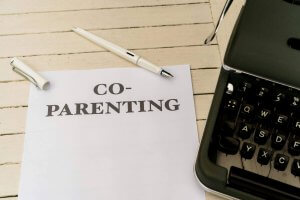When you’re co-parenting a child with food allergies, getting on the same page isn’t just about convenience – it’s about creating a safe, supportive environment where your child can thrive. Whether you’re co-parenting under the same roof or across town, alignment between parents shapes how your child experiences their food allergies and, ultimately, how they navigate life through the years. Indeed co-parenting with food allergies isn’t just about your personal philosophy on managing food allergies. It’s also about avoiding confusion for your child regarding how to manage their food allergies. It’s about preventing the anxiety of knowing which parent is right. A united front builds the confidence your child needs to navigate life-threatening food allergies.
Food Allergies and Anxiety: When Parents Have Different Approaches
Picture this: Your child is spending the weekend at their dad’s parents’ house – your former in-laws. Despite years of explaining your child’s severe peanut allergy, your ex-mother-in-law still bakes her “famous” peanut butter cookies whenever your child visits, saying “just don’t eat these ones, sweetie” while setting them right next to the safe cookies. Your ex-spouse grew up eating these cookies and brushes off your concerns with “Mom’s always been careful, it’s fine.” But you know the real risks of cross-contamination..
When you raise the issue, you’re viewed as the “difficult ex” who’s “just trying to make them look bad” or “turn the kids against them.” Meanwhile, your child is caught in the middle, torn between wanting to make everyone happy and needing to stay safe. They end up anxiously watching every plate and crumb, instead of just enjoying time with their grandparents.
This scenario plays out all too often when parents aren’t aligned in their approach to food allergies. But it doesn’t have to be this way.
with Food Allergies: Building a United Front
Creating a strong partnership in managing your child’s food allergies involves several key elements:
Shared Understanding and Education
Both parents need to be equally invested in understanding the allergies and emergency procedures. This means:
- Attending doctor appointments together when possible. (If this feels impossible, take turns attending the allergist appointments. Getting information directly from a third party can be pivotal.)
- Learning to read labels and identify hidden allergens
- Being able to recognize signs of an allergic reaction
- Understanding how and when to use emergency medications based on the allergist’s emergency plan for your child.
When both parents are knowledgeable, it creates consistency and security for your child.
Family Dynamics Matter
Here’s something important: Each parent should take primary responsibility for managing their own side of the family. If your mom doesn’t seem to take the allergies seriously, that’s your conversation to have – not your co-parent’s. This approach tends to be more effective and creates less friction between families.
With siblings, frame discussions around family respect rather than just food allergies: “In our family, we look out for each other” works better than “Don’t eat that because of your sister’s allergies.” It also diminishes resentment toward a particular person because it’s a family value that is lived out in many different ways. Supporting food allergy management is just one of the many ways we look out for each other.
Building Self-Advocacy
Your child’s journey toward independence with their food allergies should be a gradual, supported process. Work together to decide:
- When they’re ready to read labels independently
- How they’ll handle social situations
- What responsibilities they can take on at different ages
Check in with each other about progress: “Did you notice how confidently they asked about ingredients at the restaurant?” These shared observations help you adjust your approach together.
Moving Beyond Survival: Thriving with Food Allergies in New Jersey
Living with food allergies isn’t just about avoiding reactions – it’s about helping your child live a full, confident life. Instead of focusing on limitations (“We can’t eat at that restaurant”), highlight opportunities (“This is a great chance to try that new place with the allergy-friendly menu!”).
Consider these perspective shifts:
- From: “The school party will be tricky with their allergies”
- To: “We can help make the party inclusive for everyone by sharing these safe snack ideas”
Empowering Your Child
When parents work together, children learn to view their allergies as just one part of who they are – not their defining characteristic. They can become:
- Confident self-advocates
- Problem-solvers who find creative solutions
- Empathetic friends who understand different needs
- Future leaders in raising awareness about food allergies
Coping with Food Allergy Anxiety and Stress
Remember, perfect alignment isn’t the goal – progress is. Start with these steps:
- Have regular check-ins about your child’s allergy management
- Share successes and concerns openly
- Present a united front in public, even if you disagree privately
- Focus on solutions rather than blame when things don’t go as planned
The most important thing? Your child sees both parents working together to keep them safe while helping them grow into a confident, capable person who happens to have food allergies.
Whether you’re managing food allergies with an ex-partner, a current spouse, or another caregiver, remember that your united approach sets the foundation for your child’s relationship with their allergies. When you work together, you’re not just managing allergies – you’re teaching resilience, self-advocacy, and the power of teamwork.
Ready To Strengthen Your Parenting Toolbox? A Food Allergy Therapist In Branchburg NJ Can Help
Co-parenting with food allergies is more than just a set of rules—it’s about creating a safe, empowering environment where your child can thrive. You don’t have to navigate this alone. At Brave Minds, we specialize in helping families build confidence, reduce anxiety, and foster resilience in the face of food allergies. Ready to strengthen your co-parenting approach? Schedule a free consultation today at 908-224-7727 or visit us at our Branchburg or Scotch Plains locations. Let’s work together to create a future where your child feels safe, supported, and empowered!
Start your therapy journey by following these steps:
- Contact us at Brave Minds Psychological Services.
- Speak with one of our counselors.
- Start healing from the challenges of food allergies!
Beyond Food Allergy Anxiety
At Brave Minds Psychological Services, we understand that mental health concerns often overlap. That’s why we offer a variety of services beyond support for food allergies and anxiety, ensuring you and your family receive comprehensive care.We provide EMDR Therapy, couples counseling, postpartum counseling, and birth trauma therapy. In addition, we also offer therapy for trauma and anxiety. Our caring counselors provide mental health services for adults, teens, and children. We offer treatment for teen anxiety, social phobia in teens, child sexual abuse, child anxiety, and more. Prefer building a support network with group therapy? Our therapists also offer several options for group therapy. Our services are available in-person at our Scotch Plains, or Branchburg NJ office or through online therapy across New Jersey. Reach out today and take the first step toward healing and growth.





